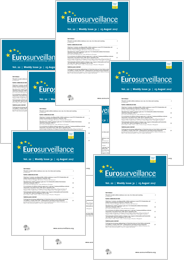- Home
- Weekly releases (1997–2007)
- Previous Issues
- Volume 5, Issue 40, 04/Oct/2001
Weekly releases (1997–2007) - Volume 5, Issue 40, 04 October 2001
Volume 5, Issue 40, 2001
- Articles
-
-
-
Early treatment of acute hepatitis C infection may be highly effective
More LessA study published online in the New England Journal of Medicine shows that prompt treatment with interferon in those acutely infected with hepatitis C virus prevented chronic infection in almost all (98%) patients (1). In this landmark study, 44 patients with acute hepatitis C were given 5 mU of interferon alfa-2b for four weeks daily, and then three times a week for another 20 weeks.
-
-
-
Latest variant Creutzfeldt-Jakob disease figures and compensation scheme announced in the United Kingdom
More LessCoinciding with the publication of latest figures on variant Creutzfeld-Jakob disease (vCJD) in the United Kingdom (UK), the secretary of state for health announced details of the full compensation scheme that has been developed to make payments to each of those who have had a diagnosis of variant Creutzfeldt-Jakob disease (vCJD) and their families (1,2). The compensation scheme for UK victims of vCJD has been developed by the government in consultation with representatives of families affected by vCJD.
-
-
-
Systemic streptococcal group B disease in Norway – an increasing health problem
More LessNorway has in the past years experienced an increasing incidence of systemic disease caused by group B streptococci (GBS, Streptococcus agalactiae) as monitored by notifications of positive blood culture and spinal fluid specimens to Norway’s Meldingssystem for smittsomme sykdommer (MSIS) at Statens institutt for folkehelse (National Institute of Public Health, NIPH).
-
-
-
Outbreak of gastroenteritis in military recruits in Germany – cryptosporidiosis suspected
S Brockmann , C Dreweck , C Wagner-Wiening , P Kimmig , D Schmid , Silke Richter , H Mertel , R Hagen , H Glaser , K Dietrich and W KiehlMore LessAt the beginning of August 2001, after a five day field exercise, about 200 out of 450 soldiers in Germany’s armed forces became ill with acute gastroenteritis, peaking after about a week (1). The incubation period was assumed to be within a range of two to 10 days, and duration of the illness was between several days and two weeks.
-
-
-
Correction for issue 37
More LessThe figure accompanying the article on echovirus 30 in issue 37 of Eurosurveillance Weekly showed all echoviruses reported in England and Wales in 1995-2001. The figure below shows the laboratory reports of echovirus 30 in England and Wales in periods of four weeks from 1996 to the present. It can be seen that echo 30 caused a smaller outbreak in the autumn of last year than this year, but that the number of reports did not reach baseline through the winter period.
-
-
Most Read This Month

-
-
Chikungunya in north-eastern Italy: a summing up of the outbreak
R Angelini , A C Finarelli , P Angelini , C Po , K Petropulacos , G Silvi , P Macini , C Fortuna , G Venturi , F Magurano , C Fiorentini , A Marchi , E Benedetti , P Bucci , S Boros , R Romi , G Majori , M G Ciufolini , L Nicoletti , G Rezza and A Cassone
-
- More Less


